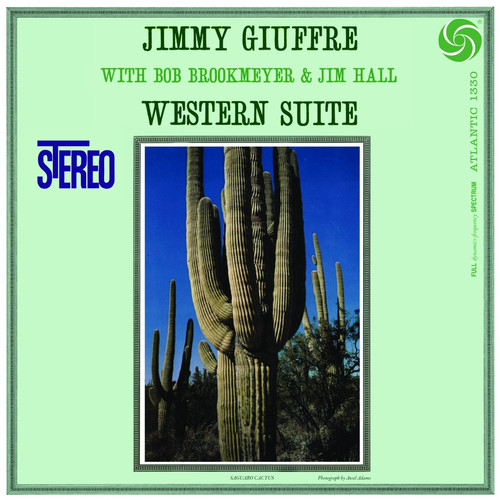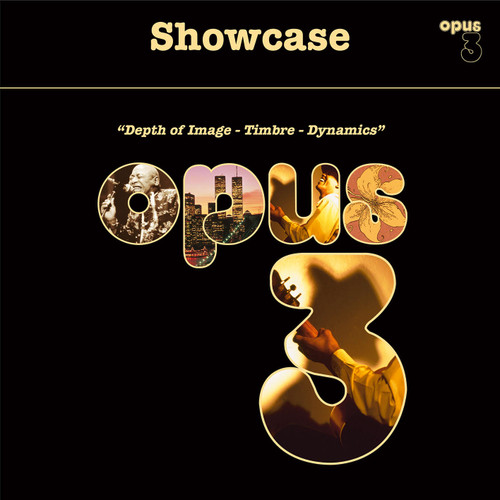In late 1957, jazz saxophonist, clarinetist, composer, and iconoclast Jimmy Giuffre broke up the original Jimmy Giuffre 3 with Ralph Pena and Jim Hall. In early 1958, for a recording session, he formed a new trio without a rhythm section. For the album "Trav'lin' Light", his new trio included Hall on guitar and the underrated trombone giant Bob Brookmeyer. For a year, they gigged together up and down the West Coast and played summer festivals, recorded, and even played clubs in New York. They became a trio of adventurous musicians for whom form was not an obstacle to creativity. As the year wound down, Giuffre wanted to document the trio once more, sensing its life was coming to an end. He composed the four-movement "Western Suite" with the trio's strengths in mind, as a way of documenting how they had come together as a band during that year. The piece itself stands as a crowning achievement in a career that included discovering the talents of Steve Swallow and Paul Bley and making the truly revolutionary recording "Free Fall" for Columbia three years later. The roots of that thinking lie in this set. Jim Hall's playing was dark, funky, ambiguous, sounding like drums and voices all at the same time -- particularly in the fourth movement. Brookmeyer became the pace setter. His lines were played as stage settings for the other two players to dialogue and narrate against. Giuffre, ever the storyteller, advanced the improvisation angle and wrote his score so that each player had to stand on his own as part of the group; there were no comfort zones. Without a rhythm section, notions of interval, extensions, interludes, and so on were out the window. He himself played some of his most restrained yet adventurous solos in the confines of this trio and within the form of this suite. It swung like West Coast jazz, but felt as ambitious as Copland's "Billy The Kid". The record is filled out with two other tunes, one of Eddie Durham's, "Topsy", and the final moment of mastery this band ever recorded, the already classic "Blue Monk". The easy stroll of the front line with Brookmeyer's trombone strutting New Orleans' style is in sharp contrast to Giuffre's clarinet playing. Which carries the bluesy melody through three harmonic changes before he solos and then plays three more. Hall keeps it all on track, and somehow the piece sounds very natural this way, though unlike "Monk", there are no edges here -- everything is rounded off. This is as solid as any of the earlier or later Jimmy Giuffre 3 records, and two notches above "Trav'lin' Light" in that it reveals a fully developed sense of the responsibilities, possibilities, and freedoms of reinventing jazz for the trio.
Zum Ende des Jahres 1957 löste der Jazz-Saxophonist, -Klarinettist, -Komponist und -Bilderstürmer Jimmy Giuffre die originale "Jimmy Giuffre 3“ mit Ralph Pena und Jim Hall auf. Anfang 1958 bildete er für Plattenaufnahmen ein neues Trio, ohne Rhythmusgruppe. Für das Album "Trav'lin' Light" gehörten Hall (Gitarre) und der unterbewertete Gigant der Posaune, Bob Brookmeyer, zu seinem neuen Trio. Ein Jahr lang traten sie gemeinsam entlang der gesamten Westküste auf und spielten auf Sommerfestivals, machten Schallplattenaufnahmen und spielten sogar in Klubs in New York. Sie wurden zu einem Trio abenteuerlustiger Musiker, für die die Form kein Hindernis für Kreativität war. Als sich das Jahr dem Ende zuneigte, wollte Giuffre die Zusammenarbeit des Trios noch einmal dokumentieren, da er spürte, dass sie sich dem Ende zuneigte. Er komponierte die aus vier Sätzen bestehende "Western Suite", wobei er die Stärken des Trios berücksichtigte, um zu zeigen, wie sie als Band im Verlauf des Jahres zusammengewachsen waren. Das Stück selbst ist die krönende Leistung einer Karriere, zu der auch die Entdeckung der Talente Steve Swallow und Paul Bley ebenso gehört wie die wahrhaft revolutionäre Aufnahme von "Free Fall" für Columbia drei Jahre darauf. Die Wurzeln dieser Denkweise liegen in diesem Set. Jim Halls Spiel ist düster, unkonventionell, mehrdeutig, es klingt wie Schlagzeug und Gesang gleichzeitig – insbesondere im vierten Satz. Brookmeyer bestimmt das Tempo. Sein Part wird zum Bühnenbild für die andern Beiden, vor dem sie erzählen und Dialoge führen. Giuffre, seit eh und je ein Geschichtenerzähler, erweiterte den Improvisationswinkel und schrieb seine Partitur so, dass jeder Musiker seinen eigenen, unabhängigen Part innerhalb des Trios hatte; Wohlfühl-Ecken gab es nicht. Ohne Rhythmusgruppe waren erkennbare Intervalle, Kadenzen, Zwischenspiele oder ähnliches zum Fenster hinaus. Er selbst spielt einige seiner zurückhaltendsten und dennoch kühnsten Soli innerhalb der Grenzen seines Trios und soweit es die Form dieser Suite gestattet. Sie hat den leichten Schwung des Westküsten-Jazz, aber dem Empfinden nach ebensoviel Ehrgeiz wie Coplands "Billy The Kid". Die Platte enthält zwei weitere Stücke, deren eines Eddie Durhams "Topsy" ist, und das bereits damals klassische "Blue Monk“ stellt innerhalb sämtlicher Aufnahmen der Band den Höhepunkt der Meisterschaft dar. Das leichtgängige vordergründige Spiel von Brookmeyers Posaune, das den New Orleans-Stil verstärkt, steht in scharfem Kontrast zu Giuffres Klarinettenspiel. Es trägt die bluesgeschwängerte Melodie durch drei Harmoniewechsel, ehe er ein Solo spielt und danach drei weitere. Hall hält das alles zusammen und irgendwie klingt das Stück auf diese Weise sehr natürlich, wenn auch nicht wie "Monk", da gibt es nichts Kantiges – alles ist hübsch abgerundet. Dies ist ebenso solide Arbeit wie jede frühere oder spätere "Jimmy Giuffre 3"-Platte, und dabei zwei Stufen besser als "Trav'lin' Light", insofern als es das vollentwickelte Bewusstsein für Verantwortlichkeiten, Möglichkeiten und Freiheiten, Jazz für das Trio neu zu erfinden, enthüllt.










